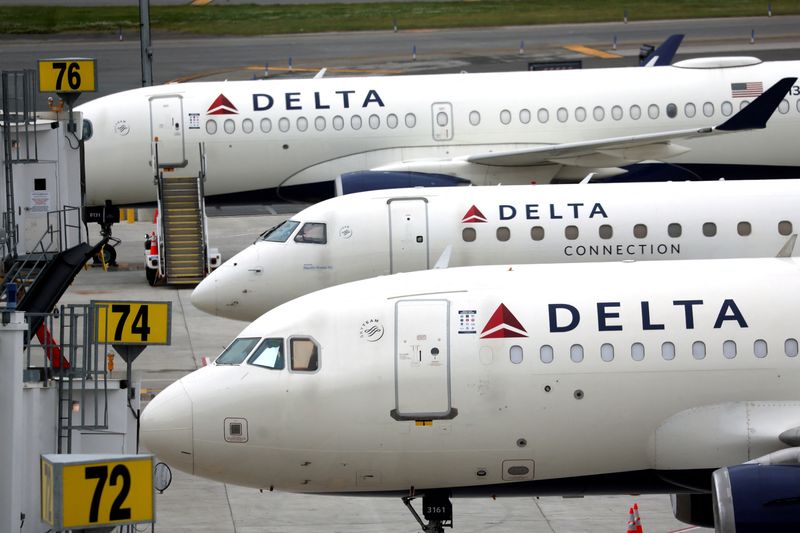By Rajesh Kumar Singh
CHICAGO (Reuters) - Delta Air Lines (NYSE:DAL) is doubling down on more profitable premium travel as it looks to shore up its defenses against an economic downturn.
Chief Executive Ed Bastian told Reuters the U.S. carrier will have premium seats on every plane it flies starting this summer. Currently, dozens of 50-seat planes, accounting for about 2% of Delta's fleet, don't have those seats.
In all, the Atlanta-based carrier, which reports quarterly earnings on Thursday, said it will offer 15,000 more premium seats a day across its network this year versus the pre-pandemic period. It declined to share more details.
Bastian said Delta wants to attract travelers who are willing to pay for something other than just a seat, helping drive up its profits.
"It also takes us out of the commodity trap, where we're just trying to win this battle based only on price," he said in an interview.
It is betting that spending by affluent leisure customers, who have been flocking to premium cabins, will be less impacted in any potential downturn. Last December, President Glen Hauenstein called them a "great shock absorber" in the face of weak corporate bookings.
Rivals United Airlines and American Airlines (NASDAQ:AAL) are also chasing premium revenue. United expects to have 53 premium seats per flight in North America by 2026 - up 75% from 2019. American has plans to increase premium seats by 45% on its long-haul flights by 2026.
"Travel at large, not just in terms of air travel, but the entirety of it is holding, if not growing as a percentage of overall GDP," Vasu Raja, American's chief commercial officer said. "It's really striking in this world that we're in where inflation is high."
American and United don't report the share of premium seats in their revenue. At Delta, that share of passenger revenue has risen to 38%, up three percentage points from before the pandemic.
Bastian said contribution from premium cabins to Delta's revenue is expected to increase by one to two percentage points each year for the next several years.
By next year, they will account for 30% of seats on Delta's flights, up 2 percentage points from 2019. The mix is set to increase further when Boeing (NYSE:BA) MAX 737-10 planes, which are scheduled for delivery starting in 2025 and will have around 35% premium seats, are part of the fleet.
This growth is coming at the expense of low-fare basic economy seats, which now make up less than 5% of Delta's seats. That opens up avenues for the carrier to grow revenue through non-ticket sources like loyalty credit card fees, checked bags and extra legroom.
Delta has said it is on track to generate more than 60% of company revenue from upscale seats and non-ticket sources next year - up from 53% before the pandemic.
Premium seats, which offer more comfort and upgraded services at airports and in flight, can be in some cases double the price of standard economy fares. They can also be up to seven times more profitable for airlines than any other cabin in the sky, analysts say.
Delta's profits and revenue growth from premium cabins have been outpacing those from low-cost seats since the pandemic, Bastian said. The demand has also been sticky, with more than two-thirds of customers showing intent to repurchase premium seats, its data shows.
The success of this strategy depends on providing reliable on-time operation in terms of arrivals and departures, said Robert Mann, a former airline executive who now runs a consulting firm. "It's kind of a litmus test," he said.
Delta and other carriers faced challenges in running a smooth operation last summer. With flight cancellations and delays causing chaos for customers, the airline was forced to cap flights for the rest of the year.
Despite those stumbles, data from consultancies OAG and Cirium showed Delta as the most punctual U.S. airline last year.
Delta aims to build on that performance, Bastian said. "It doesn't matter if you create a premium product that customers are going to be late or they're going to be canceled on," he said.
CHANGING TRAVEL PATTERNS
The quest for premium revenue has its underpinnings in the post-pandemic travel patterns.
Airline executives say hybrid work arrangements are allowing people to combine business and leisure trips, letting customers with disposable income to travel more.
Hybrid work allows every weekend to be a holiday weekend, United CEO Scott Kirby (NYSE:KEX) said late last year.
It's helping carriers fill high-margin seats, which previously used to be booked by corporate travelers. Industry officials and experts see it as a durable trend, helping reduce cyclicality in airline business.
American Airlines, for example, is now generating nearly half of its revenue from customers combining business and leisure trips. These travelers also tend to spend 40% more than a typical business customer, the airline said.

Prior to the pandemic, business travel used to account for as much as 50% of passenger revenue at major U.S. carriers, according to trade group Airlines for America.
"Consumer purchasing power is important," said John Grant, senior analyst at OAG. "But travel and holidays have just become a must have."